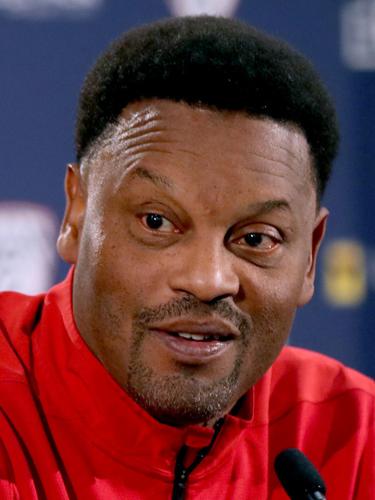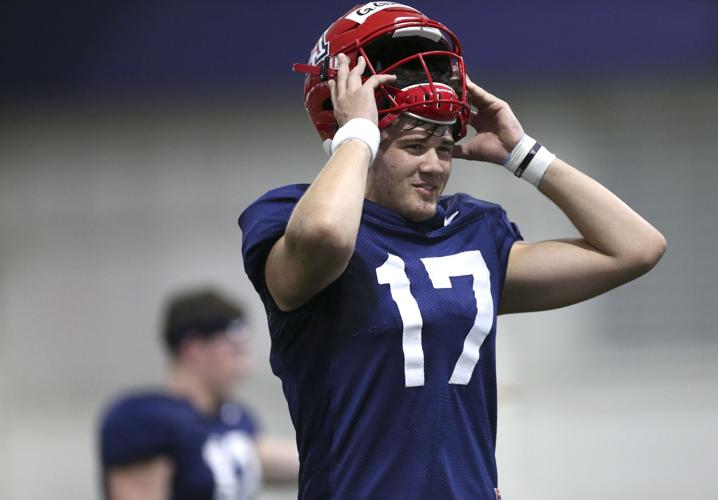The University of Arizona will not play football this year for the first time since World War II — and the Wildcats won’t play basketball until 2021 at the earliest.
On Tuesday, the Pac-12 Conference announced it was postponing all sports through the end of the 2020 calendar year because of lingering concerns related to the pandemic. That means no football, volleyball or soccer for the UA this fall, and no men’s or women’s basketball until January — the latter being a best-case scenario.
“This was an extremely painful and difficult decision,” Pac-12 Commissioner Larry Scott said during a video news briefing. “Nothing that we say will ease that disappointment.”
“This has tremendous human impact,” added Michael Schill, president of the University of Oregon and chair of the Pac-12 CEO Group. “We have students whose dream was to play this year. And that dream, at least in the fall, is not going to happen.”
The Pac-12 had been hopeful of pulling off a conference-only format, citing increased flexibility and the potential for standardized safety protocols after the release of that schedule on July 31. Arizona was to have opened the football season against rival Arizona State on Sept. 26. The UA’s original opener was slated for Aug. 29 against Hawaii.
But over the past week, the Pac-12’s medical experts determined the league could not proceed in a safe manner amid ongoing uncertainty about COVID-19 and its lasting impact.
“I hurt for the young men and coaches in our football program who have devoted their lives to the game,” UA coach Kevin Sumlin said in a prepared statement. “But we will persevere and support our student-athletes and be ready for when we are able to compete again.
“I am extremely proud of how our entire staff, and most importantly, our student-athletes have handled — and will continue to handle — the ever-changing dynamics of 2020.”
The UA men’s basketball team had been scheduled to open the 2020-21 season on Nov. 10 against NAU, part of a 13-game nonconference slate. The Wildcats also were supposed to face Colorado and Stanford in December as part of an expanded Pac-12 schedule.
“This is an incredibly difficult outcome for the entire Wildcat family of student-athletes, coaches, staff, alumni and supporters,” UA athletic director Dave Heeke said in a news release. “I have a great deal of empathy for these student-athletes and the impact this will have on them personally.
“However, the endless hard work of our student-athletes, coaches and staff in preparation for fall seasons is something we can all be proud of. The work of everyone who represents the Wildcat Way over the last five months has been an outstanding display of unity and resiliency.”
“Concerning” issues
The Pac-12 announcement Tuesday afternoon came a little over an hour after the Big Ten Conference — its longtime Rose Bowl partner and rival — made the same call. Both leagues said they will attempt some version of spring football. In all, as of Tuesday evening, over 40% of the 130 schools in the Football Bowl Subdivision had opted out of the 2020 season.
The announcement also came five months to the day after Rudy Gobert of the Utah Jazz contracted COVID-19, prompting the NBA to shut down and every other U.S. sports league to follow. The UA men’s basketball team opened the Pac-12 Tournament with a victory over Washington that afternoon — the final game of the 2019-20 season for the Wildcats.
The NBA, NHL and MLB have restarted their seasons, and the NFL is planning an on-time start. It’s been weeks since the NBA or NHL reported a positive test result for COVID-19 as their leagues operate in isolated “bubble” structures. Scott said Tuesday that such a setup is not possible for college sports.
“We cannot bubble our student-athletes like pro sports can,” Scott said.
Scott expressed the same sentiment after the July 31 schedule release, at which time he said he was “cautiously optimistic” about a fall football season. So what changed since then?
The Pac-12 cited three “concerning medical issues” in a 12-page report from its Student-Athlete Health and Well-Being Initiative:
- “Community prevalence (of the virus) remains very high in much of the Pac-12 footprint, and traveling to many places is likely unsafe, particularly on commercial aircraft.
- “New and evolving information regarding potential serious cardiac side effects in elite athletes.”
- “Testing capacity needs to increase to allow for more frequent testing, performed closer to game time, and with more rapid turnaround time to prevent spread of infection and enhance the safety of all student-athletes, coaches, and staff involved, particularly in situations where physical distancing and mask wearing cannot be maintained.”
Regarding the first factor, conference officials expressed hope that infections would diminish by January. Dr. Doug Aukerman, Oregon State senior associate athletic director for sports medicine, said a decrease “can happen between now and then if everybody in our communities works on it.”
The second factor is a reference to the recent discovery that COVID-19 could lead to myocarditis, an inflammation of the heart muscle, in some cases. The condition led the Boston Red Sox to shut down pitcher Eduardo Rodriguez, who tested positive for COVID-19 earlier this summer, for the 2020 season.
Former Florida State basketball player Michael Ojo, 27, died last week from a heart attack after reportedly testing positive for COVID-19 several weeks earlier.
“We don’t know what the short- and long-term consequences are yet,” Aukerman said.
The key phrase in the third factor is “situations where physical distancing and mask wearing cannot be maintained.” Football players have been working out and conducting walk-through practices in small controlled groups. Bringing those athletes together for padded practices and games poses a “higher risk” of spread without greatly ramped-up testing, Aukerman said.
The same applies to sports such as soccer, volleyball and basketball.
Spring season?
Scott said “a lot” of consideration was given to further delaying the start of the football season. The revised schedule called for 10 games starting in late September. Eight-game alternatives launching in mid- or late October also were discussed.
“Those were available to us,” Scott said. “But as we looked at where our counties are, and projections and trends ... we came to the conclusion, reluctantly, that there’s no indication things are likely to change in the next few weeks.”
As a result, the Pac-12 CEO Group, consisting of presidents and chancellors from each of the league’s institutions, voted unanimously to postpone all fall sports.
The conference used the word “postpone” instead of “cancel” because it still holds out hope of staging some version of what it calls the “impacted sports” after Jan. 1.
The feasibility of an abbreviated “spring” football season, likely starting in late February or early March, remains unclear.
“We’ve got a lot of work to do,” Scott said, “and we don’t have every question answered right now.”
In the meantime, the league will honor the scholarships of all student-athletes affected by the postponement. Scott said the Pac-12 is “strongly encouraging” the NCAA to make a quick decision about athletes’ eligibility. The governing body awarded an extra year to spring-sport athletes whose seasons were shuttered.
Student-athletes at the UA can continue to train and practice on campus as they have been. Football players began voluntary workouts in mid-June. Newcomers arrived in early August. They remain subject to testing and safety protocols, such as physical distancing and mandatory face coverings.
Still, without games and no clear indication when they’ll return, some players were feeling a little lost.
“So many questions,” UA junior offensive lineman Donovan Laie tweeted. “Our lives are changing forever right before our eyes.”
Sophomore quarterback Grant Gunnell tried to turn Tuesday’s news into a rallying cry, tweeting: “You have two options now as a player and a team. I know my squad is about to go harder than ever.”





